

John Yoo: Government Data Collection Doesn't Violate the Constit. Warrantless surveillance law may face test in criminal case. National Security Agency chief Gen. Keith Alexander: Edward Snowden got call-tracking order during training. The National Security Agency contractor who disclosed the spy agency's collection of data on billions of telephone calls made by Americans apparently obtained a highly-classified court order about the program during a training stint, NSA Director Gen.
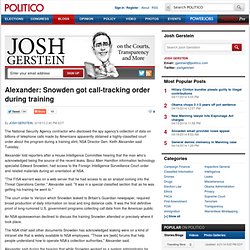
Keith Alexander said Tuesday. Alexander told reporters after a House Intelligence Committee hearing that the man who's acknowledged being the source of the recent leaks, Booz Allen Hamilton information technology specialist Edward Snowden, had access to the Foreign Intelligence Surveillance Court order and related materials during an orientation at NSA. "The FISA warrant was on a web server that he had access to as an analyst coming into the Threat Operations Center," Alexander said. "It was in a special classified section that as he was getting his training he went to. " The court order to Verizon which Snowden leaked to Britain's Guardian newspaper, required broad production of daily information on local and long distance calls.
2011 decision Today, 10:11 NSA unlawfully collected domestic ema. NSA loophole allows warrantless search for US citizens' emails a. NSA Surveillance Is Legal And Not Targeting Average Americans, S. Watchdog Report Says N.S.A. Program Is Illegal and Should End. Congressional privacy Oversight Board reports NSA program is illegal.
Report deems NSA telephone records program illegal. The metadata whipsaw. Justice Department on Friday appealed the ruling. Is NSA's Surveillance Legal? Yes or No? : From the Sidebar : Hayes Hunt : Cozen O'Connor. By Hayes Hunt and Joshua Ruby Six months after Edward Snowden began leaking information about the National Security Agency’s secret data collection methods, two federal judges - one in Washington, D.C. and one in New York – have reached opposite conclusions about whether one NSA program unlawfully searches the phone records of millions of Americans.
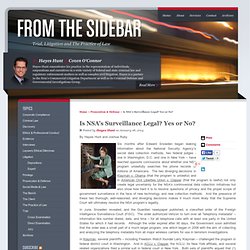
The two diverging decisions in Klayman v. Obama (that the program is unlawful) and in American Civil Liberties Union v. Edward Snowden, Whistle-Blower - NYTimes.com. Judge: NSA’s collecting of phone records is probably unconstitutional. Leon granted the request for an injunction that blocks the collection of phone data for Klayman and a co-plaintiff and orders the government to destroy any of their records that have been gathered.
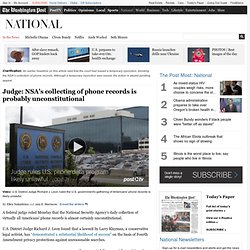
But the judge stayed action on his ruling pending a government appeal, recognizing in his 68-page opinion the “significant national security interests at stake in this case and the novelty of the constitutional issues.” “I cannot imagine a more ‘indiscriminate’ and ‘arbitrary invasion’ than this systematic and high tech collection and retention of personal data on virtually every single citizen for purposes of querying and analyzing it without prior judicial approval,” said Leon, a judge on the U.S.
District Court for the District of Columbia. “Surely, such a program infringes on ‘that degree of privacy’ that the founders enshrined in the Fourth Amendment.” A Justice Department spokesman, Andrew Ames, said Monday that the government was reviewing Leon’s decision. Federal Judge Rules NSA Phone Metadata Collection Program Likely Unconstitutional. The first significant legal roadblock to the NSA’s data collection programs prompts the question: Does this mean Edward Snowden really is a whistleblower?
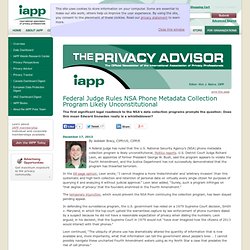
December 17, 2013 By Jedidiah Bracy, CIPP/US, CIPP/E A federal judge has ruled that the U.S. Judge Upholds N.S.A.’s Bulk Collection of Data on Calls. Snowden lawyer: Supreme Court must weigh in on NSA. Visit NBCNews.com for breaking news, world news, and news about the economy.
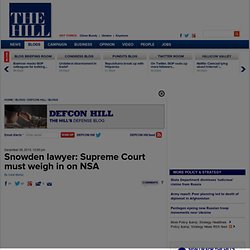
Federal Courts at Loggerheads in NSA Surveillance Cases; Snowden Disclosures to Continue in 2014.
Klayman v Obama. Media Law Prof Blog. The most Kafkaesque paragraph from today’s NSA ruling. Earlier today a U.S.
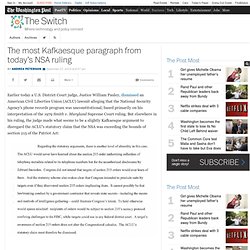
District Court judge, Justice William Pauley, dismissed an American Civil Liberties Union (ACLU) lawsuit alleging that the National Security Agency's phone records program was unconstitutional, based primarily on his interpretation of the 1979 Smith v.
Judge's Ruling Could Jeopardize NSA Surveillance. A D.C. trial judge says the government's "bulk metadata" program relies on a 34-year-old precedent obviated by current technologies.
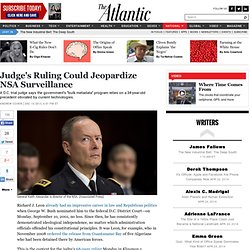
Richard J. Leon already had an impressive career in law and Republican politics when George W. Bush nominated him to the federal D.C. District Court—on Monday, September 10, 2001, no less. Since then, he has consistently demonstrated ideological independence, no matter which administration officials offended his constitutional principles. Is the NSA's Spying Constitutional? It Depends Which Judge You Ask. Two recent rulings draw diametrically opposed conclusions about the same set of facts.
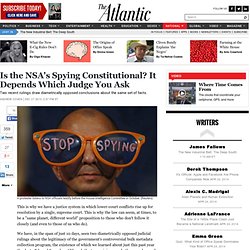
This is why we have a justice system in which lower-court conflicts rise up for resolution by a single, supreme court. This is why the law can seem, at times, to be a "same planet, different world" proposition to those who don't follow it closely (and even to those of us who do). UNITED STATES v. JONES. Opinion NOTICE: This opinion is subject to formal revision before publication in the preliminary print of the United States Reports.
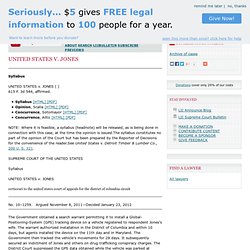
Readers are requested to notify the Reporter of Decisions, Supreme Court of the United States, Washington, D. C. 20543, of any typographical or other formal errors, in order that corrections may be made before the preliminary print goes to press. No. 10–1259 UNITED STATES, PETITIONER v. When Does Technology Change Enough That the Law Should Too?